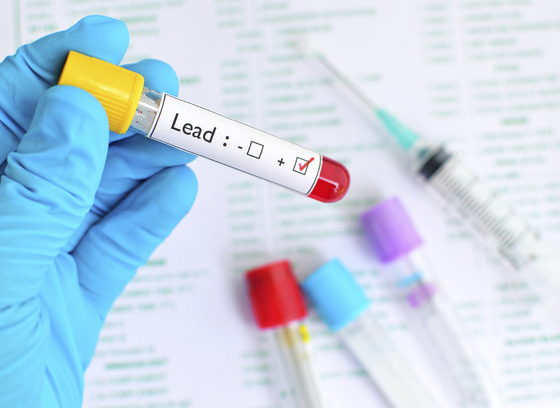Elevated Blood Lead Program
All children should receive blood lead screening during routine well-child visits to their providers at 12 and 24 months old. Elevated blood lead levels are reported to the Maryland Department of the Environment, who then notifies the child’s local Health Department.

When a child in Howard County is identified as having an elevated blood lead level, the Health Department works with the pediatrician and family to help identify the source of lead exposure and remove it from the child’s environment. The Health Department can educate families, provide case management, coordinate recourses, and in some cases collaborate with Maryland Department of the Environment to conduct home inspections. Health Department staff follows children with elevated lead levels until their lead level has dropped below the level of concern identified by the Centers for Disease Control and Prevention (CDC).
For questions or more information, call the Howard County Health Department at: 410-313-7500 or toll free at 1-866-313-6300.
Additional questions may be directed by e-mail to askhealth@howardcountymd.gov
Lead poisoning occurs when lead enters the body through contaminated air, food, water, dust, or soil and builds up in the blood and soft tissue. Anyone can have lead poisoning, but children are more at risk because they are more likely to chew non-food items, more likely to get lead dust on their hands, and they absorb lead more easily than adults. Most children with increased lead levels in their blood do not have any obvious symptoms and only find out they have been exposed to lead during routine screening. Even low levels of lead can have negative effects over time, especially on mental and physical development.
Resources:
Lead was commonly used in paint, plumbing components, gasoline, batteries, bullets and other materials before it was known to be toxic to humans. In 1978, lead was banned from use in paint in the United States. Older homes and structures may still have lead based paint. As old paint breaks down over time, it creates lead dust which can be ingested.
While lead based paint from homes built before 1978 is one of the most common sources of exposure, there are many other things that may contain lead.
These include:
- Ceremonial and/or religious powders (kajal, kumkum, sindoor, khol)
- Spices contaminated with lead (especially turmeric, cumin, chili powder)
- Imported or antique glazed pottery, ceramics, or pewter dishes
- Some jewelry
- Hobbies like fishing (lead sinkers), stained glass, pottery glazing
- Soil contaminated by lead (often near highways or homes with exterior lead paint)
- Plumbing components
- Folk/Traditional medicines (Greta, Azarcon, Ghasard, Daw Tway)
- Mexican Candy
Resources:
If your home was built before 1978, be on the look-out for chipping or peeling paint. Try to create a physical barrier between your child and areas of deteriorating paint until clean-up can be completed by a trained professional. Regularly wet-mop floors and wipe surfaces with wet cloths to remove lead dust. Do not try to remove the paint yourself by sanding or stripping because that may release more lead dust into the home.
- Wash your child’s hands frequently, especially after playing outside and before meals
- Avoid playing in bare soil
- Avoid cooking or eating food from imported or antique glazed pottery, ceramics, or pewter dishes
- Avoid using spices imported from overseas
- Do not use kumkum, kajal, sindoor, or other powders on children
Resources:
In 2016, Maryland released guidance stating that all children should have a lead test at 12 and 24 months old. Older children who have never had a lead test, or who live in a home that was built before 1978 should also be tested.
If you are concerned about your child’s lead exposure risk, or are not sure if they have ever had a lead test, talk to your health care provider today.
Resource:
If your child has been diagnosed with elevated lead in their blood, the first thing to do is to figure out how they are being exposed. Work with your doctor and the Health Department’s case manager to review your child’s environment and identify possible sources of lead, then make efforts to eliminate them. Your child will also need to be retested to make sure their lead level is coming down. Be sure to follow your doctor’s guidance on when and how often your child should be retested.
Make sure to serve your child a healthy diet rich in calcium, iron, and vitamin C, as these foods may help keep lead out of the body.